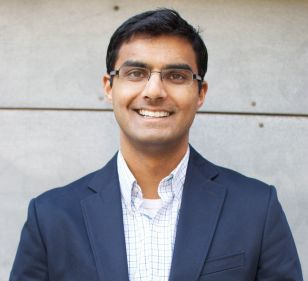- About
- Organization
- Organization Overview
- Dean’s Office
- Department of Bioengineering and Therapeutic Sciences
- Department of Clinical Pharmacy
- Department of Pharmaceutical Chemistry
- Quantitative Biosciences Institute
- Org Chart
- Research
- Education
- Patient Care
- People
- News
- Events
Stopping cancer in its tracks
Research revives prospects for a generation of failed cancer drugs using combination therapies
By Levi Gadye / Thu Jul 19, 2018

Cancerous breast tissue, with normal connective tissue (pink) and cancer cells (blue).
Cancer, fundamentally, is a problem of too much growth. For decades, health care providers have tried and failed to slow tumor growth using drugs that interfere with a particular signaling pathway, called PI3K, which is known to operate in proliferating cancer cells.
Recent findings in the laboratory of Sourav Bandyopadhyay, PhD,8 have finally revealed just how cancer resists these drugs. Tumors can actually reroute certain growth signals through an alternative pathway, called AURKA, that is unaffected by PI3K drugs. The work was published9 in Nature Chemical Biology on June 25, 2018.
The laboratory group further showed that blocking PI3K and AURKA simultaneously, using already-available drugs, could overcome resistance to P13K-targeting drugs in cell cultures and mouse models of breast cancer.
Bandyopadhyay, the senior author of the study, is a faculty member in the Department of Bioengineering and Therapeutic Sciences10, a joint department of the UCSF Schools of Pharmacy and Medicine. He is also an affiliate of the UCSF Helen Diller Family Comprehensive Cancer Center11 and the Quantitative Biosciences Institute12.
“The failure of PI3 kinase drugs has been a huge mystery,” Bandyopadhyay told the UCSF News Center13. Both PI3K and AURKA are kinases, a common type of signaling proteins. “Every pharma company in the cancer space has tried to target the PI3 kinase pathway, with little success. Now we may know why.”

UCSF School of Pharmacy
Sourav Bandyopadhyay, PhD, senior author on study
Bandyopadhyay solved this conundrum by surveying kinase signaling in laboratory-grown human breast cancer cell lines. Cancer cells with ongoing AURKA signaling managed to resist drugs that blocked P13K, leading the researchers to test the effects of combination therapies that blocked both pathways.
In the lab, the combination approach was a success, and Bandyopadhyay is hopeful that these findings will translate to cancer patients.
“This work has immediate clinical implications, and we hope this study spurs interest in combining these two classes of embattled cancer drugs,” he told UCSF News. “These data clearly warrant clinical testing and we are working to put together a phase 1 clinical trial to test such drug combinations in patients.”
Other authors on the study include first author Hayley Donnella; James Webber, PhD; Khyati Shah, PhD; Kevan Shokat, PhD; Rebecca Levin, PhD; Andrei Goga, MD; John Gordan, MD; Roman Camarda; and Olga Momcilovic, PhD, all from UCSF, as well as James Korkola, PhD, and Nora Bayani from Oregon Health and Sciences University.
The study was funded by the U.S. National Institutes of Health, the U.S. Department of Defense, the Prospect Creek Foundation, the American Cancer Society, the Gazarian Foundation, and by OHSU Pilot Project Funding.
Tags
Keywords:
Category:
Research18
Sites:
School of Pharmacy, Department of Bioengineering and Therapeutic Sciences, PharmD Degree Program, PSPG, Bioinformatics, BMI
About the School: The UCSF School of Pharmacy aims to solve the most pressing health care problems and strives to ensure that each patient receives the safest, most effective treatments. Our discoveries seed the development of novel therapies, and our researchers consistently lead the nation in NIH funding. The School’s doctor of pharmacy (PharmD) degree program, with its unique emphasis on scientific thinking, prepares students to be critical thinkers and leaders in their field.




